Did you know, over 60% of independent musicians now release their music digitally? They don’t rely on big record labels. This shows how much power modern technology has. It gives indie artists the chance to reach people worldwide. In this piece, we’ll explore tips from self-managed indie artist Shanthony Exum. She’s known as Miss Eaves and has successfully toured four times, growing her fanbase.
Key Takeaways
- Digital platforms have empowered indie artists to distribute their music globally without relying on traditional labels
- DIY music distribution allows artists to retain ownership of their rights and forge direct connections with their audience
- A range of music distribution services cater to different needs, from unlimited uploads to detailed analytics and physical distribution
- Preparation and understanding distribution processes are crucial to managing the complexities of DIY music distribution
- Leveraging social media, local street teams, and media outreach can effectively promote independent shows and releases
Evaluate Your Music Career Stage
Considering a DIY tour means thinking about your music career stage. If you’re new and still building a fan base, it’s smart to stay close to home. Stick to markets you can reach with a 1-3 hour drive. This way, you can play at the same places often and grow your following. When you begin to sell out these local shows, think about expanding your tour further.
Set Realistic Expectations
Shanthony Exum suggests using social media analytics to see where your fans are. This helps you find the best places to tour, focusing on areas where you’re already known.
Analyse Your Existing Fanbase
Shanthony Exum advises looking at artists similar to you. See where they’ve performed to find suitable venues for your shows. This ensures you target places that match your current appeal.
Identify Target Markets
Shanthony Exum’s tips are great for when you’re starting a DIY tour. It’s all about knowing your career stage, checking out your fanbase, and finding the right places to perform. Doing these steps well can make your tour match your success level and help you grow.
Find Suitable Venues
Indie artist Shanthony Exum says it’s vital to research venues well before reaching out. Imagine she’s a rapper. She wouldn’t ask a venue that only hosts metal bands. It’s important to find places that match your style to get the right gigs.
Research Relevant Venues
Exum advises looking at the music that’s played at your chosen venues. This tells you if your sound fits the place. Also, knowing about a venue’s size and what technical gear they have is smart. It shows you’re serious and helps tailor your pitch.
Prepare Promotional Materials
Before you contact them, make sure you have key things ready, Exum adds. A simple website or an EPK, good press photos, and a one-sheet are a must. These make you look professional and lets the venues quickly check if you’re a good match.
Craft Professional Pitch Emails
Exum shows how a winning pitch email to a venue might look. She mentions when she’d like to play, her music’s online success, and how she’s like other acts there. This strategy shows preparation and professionalism, improving your chances of getting booked.

Consider Working with Promoters
The music scene can be tough to navigate alone. But, working with local promoters has helped artists like Shanthony Exum stand out. Promoters offer support, know many people, and can build buzz for your gigs.
Find Suitable Promoters
Exum advises looking for promoters who book acts like yours. This makes success more likely. Check their past work and contact them to see if they’re interested.
Evaluate Costs and Benefits
Working with a promoter usually means you don’t pay upfront. They take a bit of the door money instead. But, be honest about your fan base or it could harm your future together. Think about the extra fans you might get versus what the promoter will take.
Collaborate with Local Bands
Working with local bands is a smart move for indie artists. It helps reach new fans and connect with the music scene. Shanthony Exum, an electro rapper from Brooklyn, advises finding bands that match your style.
Identify Bands with Similar Sounds
Finding local acts with a similar vibe can help you both. By teaming up, you use each other’s fanbases to grow. Exum recommends looking for artists near you that fit well, then getting in touch for a collaboration.
Propose Show Swaps
Exum likes the idea of “show swaps”. Here, she helps a band get a gig in her area, and they do the same for her. This helps both bands get more exposure and grow their fan base.
Build Supportive Relationships
Cooperation is everything. Exum stresses being supportive and active when working with other bands. This means, among other things, cheering for them on stage and making friends online and offline. Such acts help create a strong music community, where every band supports one another.
Promote Your Shows Effectively
For indie musicians, reaching out to fans is key. Shanthony Exum, known for his electric rap in Brooklyn, stresses ongoing social media efforts. It’s better than just one post about your gig.
Leverage Social Media
Use platforms like Instagram, Twitter, and Facebook, Shanthony suggests. Posts, stories, and ads keep people excited. This approach pulls fans in for a great show.
Engage Local Street Teams
Shanthony also says get friends and local fans to help. These “street teams” can spread the word by posting flyers and telling others. This builds local hype.
Connect with Local Press
Working with a promoter can get you in touch with the press, Shanthony points out. But artists can do it alone too, contacting local media for stories. This makes gigs more talked about.
independent musicians, DIY music career, music distribution, indie artists
Shanthony Exum is an electro rapper from Brooklyn who goes her own way in her music career. She does her own tours and manages her business. By doing this, she reaches more people and gets closer to her fans.

Many solo artists face big challenges and chances in the music world today. They make less money than artists with labels, but they stay independent for creative freedom and to connect with fans.
Now, it’s easier and cheaper for solo artists to make and share music, so there’s more music out there. But, a lot of music also means it’s harder to stand out. Being successful independently needs a lot of effort, courage, and the willingness to take risks.
Some wins for solo artists include world tours, big music festivals, and having their songs in TV shows and ads. Getting grants to help with their careers is also a big win. Even though the road is hard, they keep going because they’re strong and they don’t give up.
Indie music distribution has its good points like more money and direct fan connections. It also means they can reach smaller audiences, choose when to release music, and own their rights. Trying different ways to get their music out and working with other indie artists are also big pluses.
Consider Crowd-funding
Crowdfunding has become a key way for musicians to get funds from a wide group of people. They do this online through platforms like GoFundMe and Kickstarter. This method spreads music projects to more people and offers feedback from fans. This feedback can make the project even better for the audience.
Offer Unique Rewards
The Tuts, a punk-pop group, managed to get over £20,000 for their first album through crowdfunding. This was more than they expected. They used the money for studio time and to make videos. They saved money by doing much of the work themselves. Their success came from giving cool rewards to their fans.
Engage Existing Fanbase
Harriet Doveton said their fans’ support made their crowdfunding a hit. By speaking directly to their fans and offering special rewards, The Tuts did better than expected in their fundraising. The money they got helped with their album’s release costs. This strategy both found the money they needed and deepened their bond with their fans.
FAQ
What are the key considerations for independent musicians when starting a DIY music career?
How can independent artists find suitable venues to book for their DIY tours?
What are the benefits and considerations of working with local promoters?
How can independent artists collaborate effectively with local bands?
What are some effective strategies for promoting DIY shows?
How can independent artists leverage crowdfunding to support their music career?
Source Links
- https://stereostickman.com/diy-music-distribution-a-step-by-step-guide-for-independent-artists/
- https://diymusician.cdbaby.com/music-career/3-lessons-from-the-indie-artist-summit/
- https://profitablemusician.com/97-from-local-fanbase-to-global-reach-diy-music-release-strategies-with-kevin-breuner/
- https://www.indiemusicacademy.com/blog/beginner-music-business-plan
- https://www.indieflow.me/blog/how-to-start-a-music-career
- https://www.icmp.ac.uk/blog/how-get-yourself-out-there-independent-artist
- https://www.soundtech.co.uk/news/finding-success-as-an-independent-artist
- https://www.improvisedmusic.ie/supporting-musicians/resources-opportunities/diy-music-releasing
- https://sugomusic.com/independent-distributor-and-indie-artist/
- https://pirate.com/en/blog/best-music-distribution-services/
- https://dittomusic.com/en/blog/how-to-promote-your-music-independently
- https://bandzoogle.com/blog/7-best-music-promotion-strategies-for-indie-artists
- https://www.careersinmusic.com/how-to-promote-your-music/
- https://www.forbes.com/sites/melissamdaniels/2019/07/10/for-independent-musicians-goingyour-own-way-is-finally-starting-to-pay-off/
- https://diymusician.cdbaby.com/music-career/how-i-thrive-after-15-years-as-a-diy-musician/
- https://dittomusic.com/en/blog/how-to-crowdfund-your-music
- https://imusician.pro/en/resources/blog/music-funding-for-independent-artists



